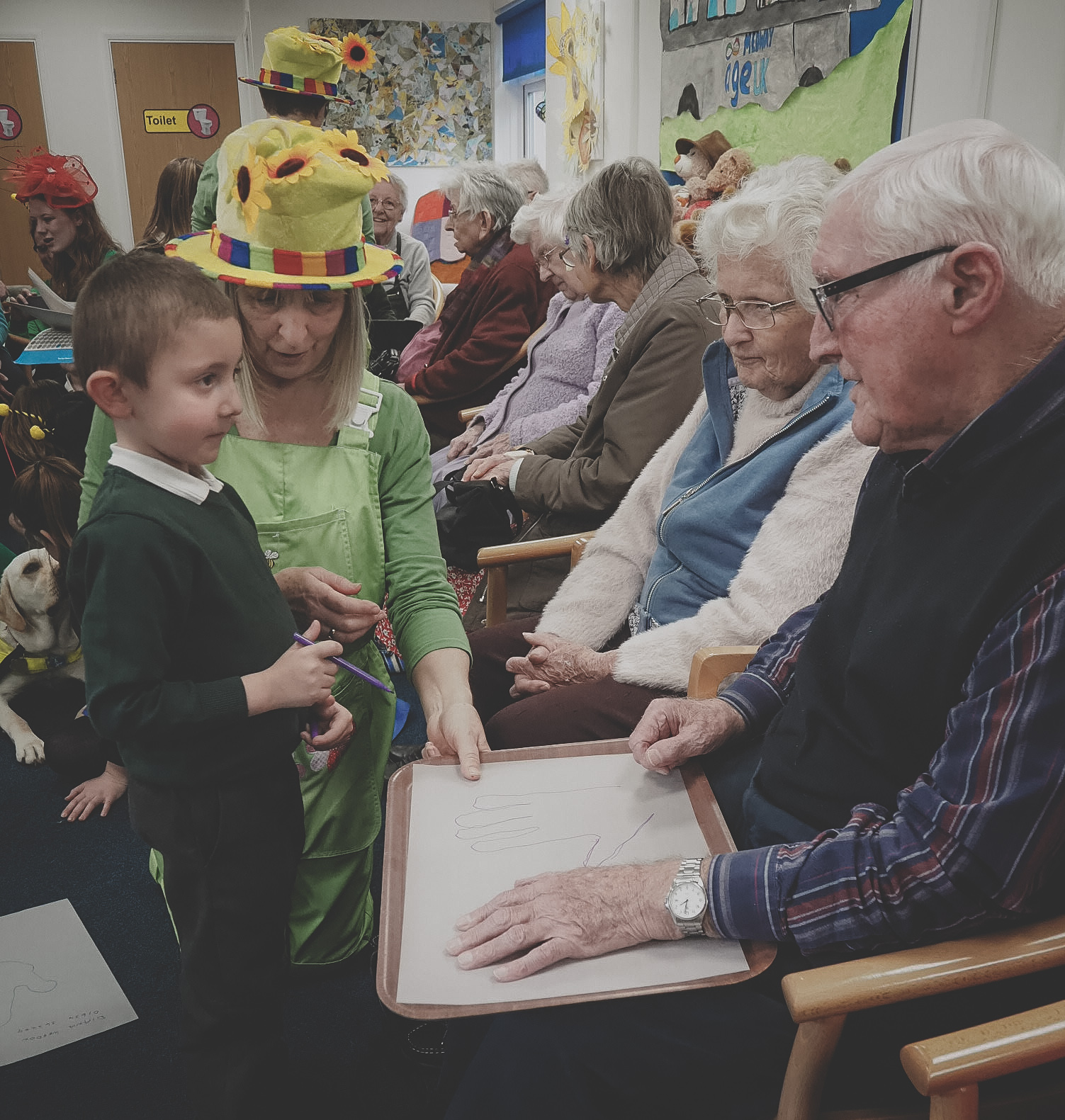With a different perspective on the Love Grows workshop phase, here is a blog from Intergen31 member, Ursula Clancy. Don’t forget to come and meet the Love Grows team and see the results of all this lovely work at b0ing! festival, Canterbury on 24 and 25 August 2019.
Reflections on Love Grows by Ursula Clancy
Love Grows is very much a one-of-a-kind intergenerational project. We went round 4 different primary schools and their local care homes to work on bringing young and old together and to create a piece about what love means to different people and how they can spread that.
With our green dungarees, wellies and flower hats we set to work, starting in Chatham, crowning the children as little bees, pollinators of love. Working with such different groups was a joy and a challenge. Of course we had a plan for each workshop, none of which went accordingly but we overcame this and adapted quickly and in hindsight, it made each workshop new and unique.
We worked with a smaller group of children in Chatham, of about 10. They were a wonderful mix and we began our quest to find out more about those they loved. To do this we drew around their silhouettes, in which they wrote names of people older or younger than them that they loved and then picked one person. From there, they came up with five words that reminded them of that person, then picked one of those and finally came up with a gesture to express that word. For example, one of the girls I was working with chose her aunty who had brightly dyed hair, so her word was rainbow and the gesture she picked was to put her arms up above her head, almost like a halo.
Working on topics like this can be difficult and must be done with care as some children may have sensitive connotations; someone may have lost a parent or grandparent, or any other family member, so we have to be careful to be inclusive of this and not word our instructions in such a way that may cause upset. We also had to be prepared to listen actively and be cautious about any of the children opening up to us about something that may be upsetting, like a parent dying.
We were told after that the children from this group had been handpicked as they are less likely to get chosen for other events and workshops etc for their individual reasons – some were very shy, others did not speak English or may have had behavioural issues. I thought it was really great to have given these children a chance and I was also grateful that we did not know about this until after as sometimes if you are given this information you can pre-judge a situation or person and automatically put them in a box which may have altered our attitudes towards them. I feel this way the children were allowed to have fun and more of a chance at being treated equally.
We faced different obstacles with different schools, for example in the other three schools we had more children than expected, especially in Margate. But again, we managed to find solutions easily and adapt our material accordingly and the staff were often accommodating too – in Margate we had plenty of assistants to help us out. At the end of the first workshops, we sent the children home with a small investigators pack, including a magnifying glass and a sheet of questions, for them to find out more about the person they’d chosen.
It was so much fun to listen to the children and hear all their stories and how creative they can be in making those stories come alive.
For the second round of workshops we worked with the older community and this presented new challenges. With Age UK in Chatham/Gillingham we had very limited space and a lot more residents that we expected to be working with, but we teamed up in groups and made the most of what we had. In Margate, the residents from Age UK came to the school as there were fewer of them and we had more space. When working with the Canterbury group, we split the Love Grows team in two and one group went to work with the children at school and the other went to the Red House care home to work with the elderly there as this was the most practical solution for numbers, space and ability. Finally, in Littlebourne we didn’t work with a care home but we had some of the older community from around the village come to the school to work with us. It was really interesting working in the different environments and because we had to adapt to each environment differently, it made each workshop new and exciting. I particularly loved working in Margate and Littlebourne because of the stories that came out of the sessions. It was really wonderful to see how the children talked to the adults and got to know them and share their stories and vice versa. It was important to try and keep everyone on track but also to acknowledge when some people were enjoying certain parts of the workshops. For example, in Margate one of the women and one of the children were telling stories to each other and when everyone else was getting up to dance I thought it would suit them better to let them continue talking as they seemed very engaged with each other and it benefited the project for them to continue talking and form that bond, which is what Love Grows is all about; breaking down that barrier between young and old and sharing their stories of love. It was wonderful in Littlebourne too as we had more active adults and because they’d come from around the village they all lived different lives so we were able to get some very interesting and beautiful stories from them.
The other three workshops were about closing the gap between the generations and collecting stories of love in all forms; mothers and daughters, grandchild and grand-parent, friends, neighbours… our second workshop was similar to the first one but adapted for the adults, so the children drew around the adults’ hands and asked them about the special people in their lives and helped them find a gesture for their words. The third workshop involved planting sunflower seeds and the fourth was doing biscuit portraits for each other and celebrating the work we’d done over the past few months. The fourth one was my personal favourite as both the adults and the children (and teachers in some cases) had so much fun and while they were decorating their biscuits they just got to chat with each other and have more relaxed conversations about what they loved.
One of the important things for me, which I took away from this project, was that it didn’t just benefit the children. Yes, they had the opportunity to learn about the joy of sharing stories and closing the gap between generations, but the adults also got to have a lot of fun and have an experience that some had never had before – some of the adults said that when they were younger they would not have had these sorts of conversations with adults. It also provided them with company and entertainment, for some it was a little burst of activity and a chance for those who had a green thumb to teach and guide other people through one of their passions. And for others it simply gave them the comfort to talk about people they loved, maybe people they’d lost and possibly give them the feeling that there is a witness to their life.
Now we’re in the final stages of putting together all the work into a final dance as a huge celebration of love and our work for the ‘bOing! Festival’ of which is immensely fun. I look forward to performing the final result, and to glitzing up our costumes to perform in the sun (hopefully!)

